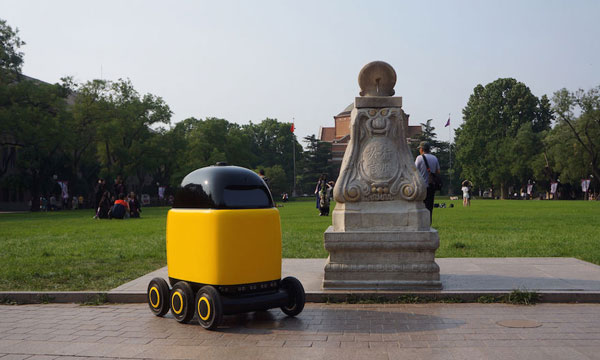去门口取快递,来的是一匹“真机小黄马”! 'Little yellow horse' robot delivers useful service in China
中国日报网 2018-07-20 14:00

每逢购物促销,或者天气不好,就有些顾客抱怨快递送货又被拖延了。还有些懒癌患者,总在纠结为啥小区保安又没让快递员进来。无人技术终于也瞄准了“最后一公里”。下次再接到取货消息时,给你送货的可能不再是那个熟悉的快递员,而是一匹“真机小黄马”。

Along a quiet residential street on the outer edges of Beijing, a yellow and black cube about the size of a small washing machine trundles leisurely to its destination.
在北京郊区僻静的居民区里,一辆黄黑相间的立方形小车正悠闲地驶向目的地。小车大概有一台小型洗衣机大小。
This "little yellow horse" is an autonomous delivery robot, ferrying daily essentials like drinks, fruit and snacks from the local store to the residents in the Chinese capital. Equipped with a GPS system, cameras and radar, the robots are seen by their creator as the future of logistics in China, where he says one billion packages will eventually be delivered every day.
这匹“真机小黄马”是一个自主送货机器人,可以把附近商店的饮料、水果和零食等日常用品配送到北京居民手中。发明者认为,装有GPS系统、摄像头和雷达的送货机器人代表着中国物流的未来。他说,今后中国每天的包裹发送数量将达到10亿个。
Travelling at a less than overwhelming 3kph - a slow human walk - the robot has room for improvement, said one customer as she removed a packet of nuts from its bowels.
一位顾客从“真机小黄马”的送货箱中取出一包坚果时说,这款送货机器人还有提升空间,它的时速还不到3公里,相当于人们慢走的速度。
"The weak point is that it cannot deliver directly to the door like a human," said the customer, who does not live on the ground floor.
这位顾客表示自己不住在一楼,“它的缺点是不能像快递员那样送货上门。”
"But it's still quite practical. The robot delivers relatively quickly," she said.
她说:“不过还是非常实用。机器人的送货速度相对较快。”
The robot takes advantage of Chinese consumers' love of cashless payments and smartphone shopping.
这款机器人利用了中国消费者对无现金购物和智能手机购物的喜爱。
China is the world's biggest online shopping market with more than half of its population making at least one smartphone purchase per month, according to professional services firm PwC. This compares to 14 percent in the rest of the world.
普华永道会计师事务所称,中国有全球最大的网购市场。有超过半数的民众每月至少用手机购物一次。而世界其他地方只有14%的人每月用手机购物一次以上。
Whether buying electronics or toilet paper, avocados or clothes, Chinese are used to simply tapping a button on their smartphone and getting a home delivery - sometimes several per day.
不管是购买电子设备还是卫生纸、牛油果或衣服,中国人已经习惯于按下智能手机屏幕上的一个按键就享受快递到家服务,有时一天要下好几单。
To get a delivery via the "little yellow horse", the customer selects the desired products, taps in the address and pays via their phone.
如果想用“真机小黄马”取货,顾客需要选好商品,输入地址,并通过手机付款。
The supermarket staff place the items in the robot, and the robot bustles off.
超市工作人员将商品放在机器人里,机器人旋即离开。
Liu Zhiyong, founder and CEO of Zhen Robotics, which manufactures the robot, sees a bright future for his yellow creation.
“真机小黄马”制造商真机智能创始人兼首席执行官刘智勇称,这款送货机器人前景光明。
"At the moment, there are 100 million packages delivered every day in China. It will be one billion in the future," he says.
他说:“中国目前每天有1亿包裹需要投递。未来将有10亿。”
"There will not be enough humans to make the deliveries. We need more and more robots to fill this gap in manpower. And to reduce costs."
他还说:“将来快递员人手不足。我们需要越来越多的机器人来填补这一人力缺口,降低成本。”
These costs are especially high in the last kilometre of a delivery, where precision is key and a customised service is required to get the product to the front door.
最后一公里的人力配送成本尤其高,因为把货物送到顾客家门口的关键是精准度以及定制服务。
Weighing 30 kilograms and with a theoretical top speed of 12kph on their six wheels, the robots have four cameras constantly scanning the world around them and a laser tele-detection system allowing them to avoid obstacles.
这款机器人重达30公斤,有6个轮子,理论上的最高时速为12公里,有4个摄像头,不停地扫描四周,并安装了激光远距离探测系统,以避开障碍物。
But not everyone is convinced the robots are a long-term logistics solution.
但并非所有人都相信送货机器人是一种长期的物流解决方案。
Shao Zhonglin, former deputy secretary-general of the China Express Association, noted they were useful "over a short range".
中国快递协会原副秘书长邵钟林说,它们在“短距离内”是有用处的。
"It's not certain however that they can be a broad solution for the final kilometre of delivery. Because the client still has to come down to get his package," added Mr Shao.
他补充说:“但是不能确定它们能否成为最后一公里配送的广泛解决方案。因为客户还是要下楼取包裹。”
"Plus the costs remain quite high: buying and maintaining the robots, operating costs, etc."
“此外,送货机器人的成本仍然很高:包括购买和维护成本、运营成本等。”
But Zhen Robotics is convinced the costs will come down over time.
但真机智能公司认为,今后这些成本将会下降。
Mr Liu also says the robot will soon be equipped with the necessary technology to operate a lift, meaning it will no longer be confined to ground-floor deliveries.
刘智勇还说,不久之后他们就能给这款机器人配备必须的技术,让它能够搭乘电梯,也就是说,今后不再限于一楼取货了。
In the meantime, deliveries in China are increasingly being made by autonomous means. In recent months, several firms have received the green light to operate drones, either to deliver directly to the customer or to ferry goods between hubs.
与此同时,自主送快递在中国越来越普遍。最近几个月,已有几家公司获准通过无人机送货,无人机可以直接送货给客户,或在配送中心之间运送货物。
And Mr Liu has a warning for anyone trying to vandalise or steal the yellow robot.
刘智勇还警告了那些想破坏或者偷走送货机器人的人们。
"With GPS, we are constantly tracking them, cameras are filming and it can sound an alarm," he says.
他说:“机器人安装了GPS系统,我们一直在跟踪,摄像头也一直在拍摄,机器人还会发出警报。”
"Anyway, what would a thief do with it? It's not exactly resellable."
“不过,贼偷来又有何用呢?又不能转卖。”
英文来源:法新社
翻译&编辑:yaning

















 英语点津微信
英语点津微信 双语小程序
双语小程序